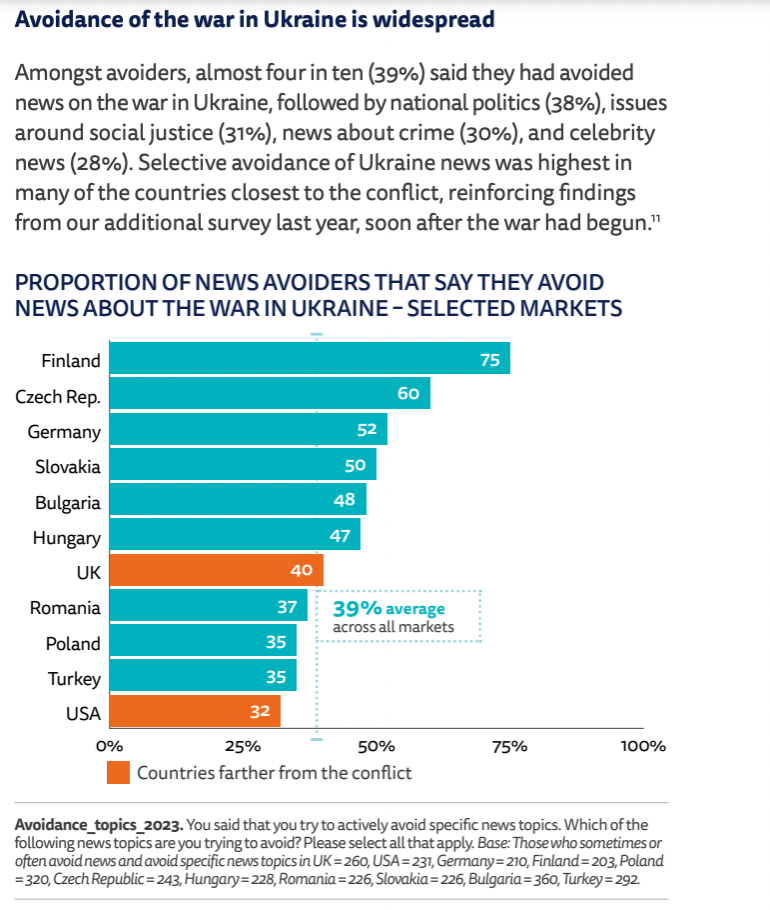News about Ukraine is the most avoided in the world in 2023, according to an international survey of nearly 100,000 people, but the finding comes as Kyiv Post reaches record readership levels.
The Digital News Report released today found that nearly 40 percent of those who occasionally, sometimes or often avoid news choose Ukraine as the topic that they most steer away from.
JOIN US ON TELEGRAM
Follow our coverage of the war on the @Kyivpost_official.
Avoidance of Ukraine-related news, according to the survey, was highest in Europe, including in some countries that border Ukraine, but less pronounced in staunch Ukrainian allies such as the US and the UK.
The Report is an annual research project by Oxford University’s Reuters Institute for the Study of Journalism that surveys around 2,000 representative sets of people in 46 countries.
It was conducted in late January and early February 2023 – or around the first anniversary of Russia’s full-scale invasion of Ukraine. Data is weighted for age, gender, and region. Educational and political quotas are applied, e.g., required sample sizes according to different levels and views.

The findings run counter to the direct experience of Kyiv Post itself.
Kyiv Post’s own readership – as measured by various indicator categories on its website – has reached its all-time high in 2023.
Founded in 1996 as a local printed newspaper aimed primarily at expatriates and physically distributed through a network of restaurants and cafes, Kyiv Post is now approaching around 3 million visitors per month with high readership days of over 250,000.

Diane Francis Interviews Mikhail Zygar, Yaroslav Trofimov on Prospects of Russia’s War on Ukraine
Other key findings of interest to readers, publishers and policymakers concerned about Ukraine and Russia’s full-scale invasion contained in the report were as follows:
· Despite the near ubiquity of internet access, fewer people are participating in online news than in the recent past. Aggregated across markets, only around a fifth (22 percent) are now active participants (such as sharing, commenting, or liking content) with around half (47 percent) not participating in news at all. Those that continue to participate are increasingly non-representative and/or more partisan.
· Across markets, well over half (56 percent) say they worry about identifying the difference between what is real and fake on the internet when it comes to news.
· There is a shift away from going directly to websites for news (down by10 percent in five years) and towards search engines (up by 25 percent in five years), finding news on social media (up by 7 percent in five years) or via aggregating platforms (up by 8 percent in five years). The change toward social media platforms, including TikTok and Instagram, is especially true for younger readers and for female readers.
· Across markets, overall trust in news (40 percent) and trust in the sources people use themselves (46 percent) are down by a further 2 percentage points this year. As in previous years, the survey found that the lower trust levels are in countries with higher degrees of political polarization such as the United States (32 percent), Argentina (30 percent), Hungary (25 percent), and Greece (19 percent).
Ukraine and Russia are not among the 46 countries included in the survey sample.
Kyiv Post has approached the Report’s authors to determine why. In Russia’s case, the Report’s Executive Summary notes the study’s attempt “to focus on meaningful comparisons across markets that are broadly similar,” which may be difficult considering the case of the state-controlled and disinformation-filled Russian media sector.
You can also highlight the text and press Ctrl + Enter






